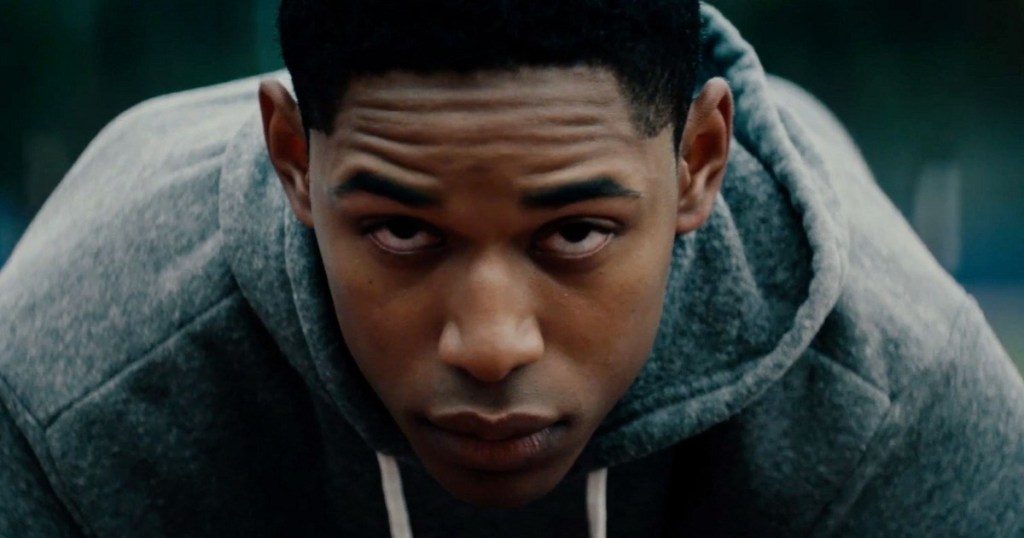
Adopted out of a war torn country at 10 years old, Luce (Kelvin Harrison Jr.) is raised by two Caucasian Americans, Amy (Naomi Watts) and Peter (Tim Roth). Luce grows up to essentially be the perfect child and student. He’s smart, lovable and ambitious, with very impressive future prospects. As a result, the expectations surrounding Luce are incredibly high. From his parents to his teacher and even his classmates, everyone knows Luce is destined for greatness. Because of this, everyone seems to put Luce in a box and tries to protect him.
The pressure on Luce finally comes to a head when a teacher, Harriet Wilson (Octavia Spencer), is unnerved by an assignment that he submits. And so begins the dance between our protagonists.
In their review, Rogerebert.com calls Luce ?one of those ?we need to talk about race? movies?. It states, “At worst, it intensifies and reinforces the stereotypes it claims to be against”. Personally, I feel that this completely degrades the race conversation that this movie presents. The conversations brought to light by Luce are so much more important than some are giving it credit for.
To begin, it seems as though Luce struggles with the perception that he’s not “black enough” or even “American enough”. He began his life in an African country and then had to transition to being raised by white parents in America. He presents himself as being very westernized. He’s unlike some of his black friends. In fact, Luce discussed this with one of his white friends, Kenny (Noah Gaynor). While discussing the dangers of black people walking around at night smelling high, Kenny argued that Luce would be fine and that he was nothing like another troubled black man in the school, DeShaun (Astro). Luce pointed out that they’re both black. Kenny then had the audacity to draw a contrast, stating that DeShaun is “black black”. “Then what am I?” Luce inquired. “Luce,” he replies.
In the same vein, Luce is also treated differently than DeShaun by the school authorities. For example, DeShaun gets his locker searched, gets kicked off the sports team and therefore loses his scholarship, yet when Luce’s locker is searched and he starts getting into a bit of trouble, he loses nothing. Why? Because they want Luce to succeed. They want to continue to keep him in the box they’ve built for him. Ms. Wilson says that it’s the duty of the black students to never be stereotypes. As a result, Luce questions why black people need to be perfect to be accepted. THIS is what this film is ultimately about.

Throughout Luce’s troubles, it’s very intriguing to see the subtle shifts in dynamic between Luce and his parents. Tim Roth does an outstanding job and brings a unique personality to the character of Peter. Amy continuously drills home how hard she worked to raise Luce. (Nevertheless, even though I never doubted that Amy loves and cares for Luce, it was mildly perplexing to hear her discuss his growing up in such a transactional way.) Through their interactions, we see a struggle between their desire to believe their son and how they should handle the delicate situation at hand.

I love the track that plays in the background of multiple scenes. It’s haunting, tense, yet has a nice beat. I thought it was a perfect pairing for this film.
Unique to Luce is the fact that it doesn’t have the classic beginning, middle, and end. Based on a screenplay by the director, Julius Onah, and J. C. Lee, it is very much a sliver of the lives of the characters. Movies of this ilk often leave certain information up to the imagination and can be lacking in closure to story lines. Depending on the film, one can either be yearning for answers, or be satisfied in the unknown, and appreciate the artistic ambiguity. With Luce, I was left starving for more information. I fully appreciate the necessity of the mysterious tone and leaving certain aspects up to the imagination but, personally, I could have used more.
Luce is in theatres on Friday, August 9th, 2019.




